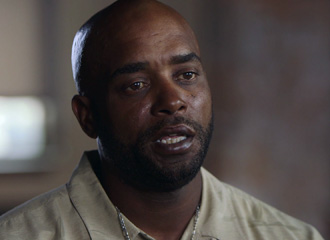Small Steps Lead to Big Strides
4-minute read
Small Steps Lead to Big Strides
4-minute read
Sheri wasn’t always sure how to approach her husband, but the one thing she tried to do was keep things positive. “I let him know that we loved him,” she says, “and that there was help available for him.”
Her husband, Vernon, was facing mental health challenges after a training accident in the U.S. Army had left him in a coma for 30 days. He just kept reliving that moment, over and over, rolling down that cliff. He experienced depression, nightmares, isolation, and substance use issues. He began to pull away from his family. He stopped taking care of himself.
“I didn’t know whether to say hi,” Sheri says. “I didn’t know whether to give him a hug, or whether to leave him alone.”
I didn’t know whether to give him a hug, or whether to leave him alone.Sheri
Finally, it was a conversation that Vernon had with his daughter that began to change things. “She went in the back room, and she talked to Vernon,” Sheri remembers. “And she said, ‘You know, you’re not fun anymore. You don’t have fun with me. You don’t talk to me anymore. We don’t play anymore.’ She said, ‘Maybe you should go see the doctor again.’”
It was a turning point. But for family members and friends of Veterans, starting conversations like that one — or just finding a first step to take — can be hard. What are the right words? When is the right time? Here are a few tips for talking with the Veteran in your life about possibly seeking care:
- Take small steps. Be willing to limit conversations to 10 or 20 minutes at a time, if necessary.
- Minimize distractions during your conversations. Turn off phones, the TV, and other devices.
- Remain respectful and calm.
- Avoid giving advice unless the Veteran specifically asks for it.
- Be patient. It usually takes more than one conversation before most people accept the idea of seeking care.
- Don’t argue or attempt to talk a Veteran out of feeling or thinking a certain way.
- Allow the Veteran to decide whether or not to talk about what they have experienced or what they are dealing with now. If they don’t want to, that’s OK.
- Let the Veteran know that the door is always open, and you’re willing to listen without offering advice or suggestions.
Don’t give up. That’s the advice Sheri offers: “If you feel alone, seek help. There’s not only help for the people suffering with mental illness, but there’s help for [family members] as well. If you have any questions, any concerns, instead of guessing and just being frustrated with yourself, like you don’t know the answers, ask questions. There’s help available, and it does work.”
And don’t force the conversation. Todd learned that as he supported his wife, Jodie, a U.S. Marine Corps Veteran, as she faced the effects of military sexual trauma. “You may have to be that ear to listen, that shoulder to cry on,” he says. “That compassionate person just to walk them through to the next stage.”
For Vernon, that compassionate person was his stepdaughter. The night after she approached him in the back room, he recounted the conversation to Sheri with tears in his eyes. “Just the look of despair and concern that was on a child’s face,” Vernon says, “that’s when I really knew I needed to do something.”
“Less than a week later, he sought help,” Sheri says. “And he’s been on his way ever since.” After seeking help through VA, Vernon became more open with his family and more active in their lives — attending school events, participating with the PTA. And he began to help fellow Veterans.
“He’s a wonderful husband,” Sheri says. “He’s caring. He’s supportive. He makes me feel good about myself. I can just be easy. I don’t have to walk on eggshells. … I’m very proud of him.”

